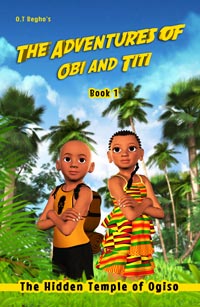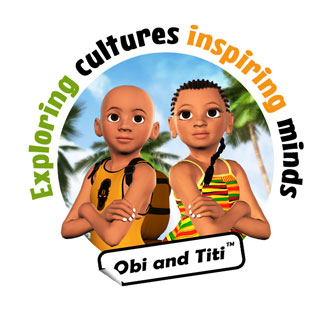The Adventures of Obi and Titi Series

Teaching guide
Chapter 1 (40-60mins)
Breakdown
- Re-cap of last lesson / review of homework
- Pre-reading preparation
- Book reading – Chapter 1
- General questions
- Quiz time
- Group discussion
- Vocabulary
- Activity Sheet
Aims and Objectives
The aim of this lesson is to focus on listening , comprehension and verbal reasoning.
At the end of the lesson, your students should :
- be able to summarise the chapter, which should include who the main characters are, their relationship to one another and describe the predicament, which has unfolded.
- have learnt some basic facts about the Benin kingdom such as its reign period, the name of its people and what it was well known for.
- begin to understand different motivating factors, which influence the writing of history.
Pre-reading preparation
We suggest the teacher reads at least the first chapter aloud to the students to help set the tone. Tell them to listen out for any words they haven’t heard before or do not understand.
It may help to listen to the author’s dramatised audio version.
The author has left a short welcoming message below for your students, which you can read out before starting the book.
Note from the Author
Welcome young adventurers, budding archaeologists, and historians. It is time for you to take a journey into the past, to a place whose history has been forgotten or in many cases erased.
These short lessons, games and activities will help you follow the crumbs and piece together the facts like the fragments of a broken jar. Thankfully, there have been many before us who have helped find these truths and we will be using their research to light the path ahead of us.
Remember, history has many versions, but it is up to you to learn how to decipher the truth and use your deduction and inference skills and some common sense to see through the smoke and mirrors. Are you ready?
Lesson One – Question everything!

After reading the first chapter, which takes 10-15 mins, your students should be given the opportunity to ask questions and then ask them to write a quick summary of the chapter. Subsequently, you can split them into groups or they can work individually on the following quiz.
Once they have finished you can review their answers as a group and begin the group discussion below.
Fact or fiction?
Be careful when using Wikipedia and other websites in the classroom, especially in the context of teaching African history. There are still many websites (knowingly and unknowingly) that promote the negative narrative and stereotype of Africa, and using them as links in the classroom may give them undue validity.
Discussions on propaganda, myths, and motives will gradually help your students, to some degree, to discern accurate information for themselves, but for now we will stick to positive, widely known facts. We will try and compile links to help you as you progress through this guide, but if you are eager to begin your own research try looking for people of African heritage and those from the continent telling their own history. Some leading names in this field are:
- Professor Cheikh Anta Diop
- Yosef ben-Jochannan
- Robin Walker
- Dr. Ivan van Sertima
- Professor DuBois
- Professor DeGraft-Johnson
- Professor Chancellor Williams
- Professor John Jackson
- Professor ben-Jochannan
These are all world-renowned researchers whose work has been under the spotlight for decades. Their work has stood the test of time as they set out to prove, scientifically, their case of Africa’s advanced historical past and its contribution to civilisation as we know it today.
Group Discussion
Did the Benin Kingdom really exist? If so, where is it today?
See if they can find it on the map of Africa.
Explain to them that it did exist and that many parts still remain today such as the capital, Benin city but the area where it once was is now known as Nigeria.
Provide them with some history about the Benin kingdom.
See if you can find the Ikpoba river on Google maps?
If you don’t have a computer available in the class print off the map from the link below
Why do you think stories were made up about the river?
Let your students come up with as many reasons as possible.
Afterwards try and categorise these reasons into those that could be seen as good and those as bad, by looking at the motivating factor behind them.
For example – A group of fishermen made up the stories to deter other fishermen from going there and catching fish.
Why do you think stories have been made up about Africa?
Here you can discuss terms such as myths, propaganda, fake news and the motivations behind them. This should then be related back to Africa’s perceived image and history.
Remind them of the wealth of resources Africa has.
Vocabulary
Words and Meanings
The book contains several content-specific words that may be unfamiliar to students. Review the words your students have written down or use some from the vocabulary link below and have them make predictions about the word’s meanings by how it is used within the text.
Activity Sheet
If time permits, your students can start this activity sheet in the class. You can set it up as a competition to see who can find the country name first (they must keep it a secret until the exercise is over). They can do the second part of the activity sheet as homework. They will need to use the internet, the library or find someone that knows the colours of the flag and colour it in. They should also find out one fact about the country.